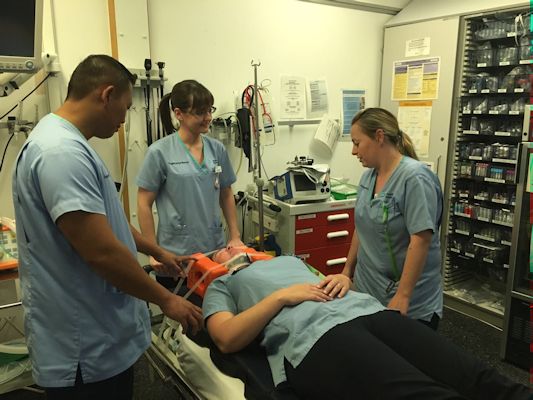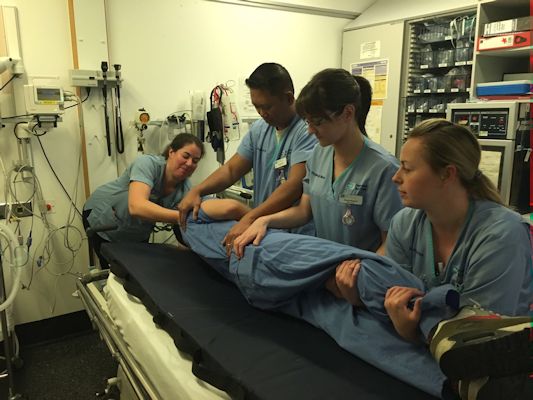
Jill, Clinical Educator, Ulster Hospital – View the video here
Continuous professional development and education is essential to support the on-going competence and growth of Emergency Nurses, which in turn contributes to the provision of safe, effective person-centred care.
Emergency Nurses, as with all nurses, are responsible for supporting and enhancing the professional knowledge and clinical skills of students. Emergency Care Nurses act as role models for students creating an open and transparent culture within which the patient care experience is central to person centred care. Emergency Nurses support the design, development and delivery of relevant programmes which aim to ensure nurses are equipped with appropriate knowledge and skills to deliver quality services to patients and clients. Within the clinical area the Emergency Care Nurse is role often a teacher, mentor, counsellor, facilitator and coordinator.
Nurse Educators may be employed by an education or service provider organisation or a professional body to provide comprehensive educational opportunities. Within the actual Emergency Department, there are numerous opportunities for staff to develop their teaching / education skills. These include being involved with in-house training: delivery of life support courses and simulation training, to Mentoring and supporting pre-registration Nursing students to holding a Clinical based educational post such as that of a Clinical Educator.
-
Clinical Educator
The role of the Clinical Educator is to support education and development of all staff within the Nursing Team. Clinical Educators are registered Nurses with extensive clinical experience and will usually have completed a Post Graduate Certificate in Education (PGCE).
Although not employed in every Emergency Department in the HSC Trusts Clinical Educators who are based within the Emergency Care setting play a pivotal role in staff development, education and learning including; development of local induction programmes, enhancing opportunities for pre-registration nursing students to meet their learning objectives, supporting mentors in practice, supporting preceptorship programmes for new registrants and identifying and coordinating on-going mandatory training for registrant and non-registrant staff.
As part of the role they develop deliver and evaluate specific emergency care education packages, or work in partnership with internal training teams/specialist teams, to secure access to relevant education which in turn supports the competence and confidence of staff to provide safe and effective, high quality patient care.
Clinical Educators are also involved in the commissioning of education programmes for Emergency Nurses offered by educational providers such as the Clinical Education Centre and the Higher Education Institutions. They act as a resource providing information and advice and signposting staff to other educational opportunities where relevant.


Staff training in an Emergency Department
-
Nurse Education Consultant (In-Service Education)
Nurse Education Consultants are employed within Northern Ireland by the Clinical Education Centre (CEC). The CEC provides In-Service Education to Nurses, Midwives and AHPs employed in the five Health & Social Care Trusts. In addition CEC provides consultancy to the voluntary, community and independent sectors alongside other statutory organisations. A number of Nurse Education Consultants within CEC have a background in Emergency Care Nursing and deliver programmes specifically to meet the needs of Nurses working within Emergency Departments across Northern Ireland.
Nurse Education Consultants are registered nurses who have a Post Graduate Certificate in Education (PCGE), including clinical and education training, coupled with many years of expertise in the Emergency Care Nursing.
-
Nurse Lecturer
Nurse Lecturers are registered Nurses with post-registration clinical experience coupled with post graduate education. Essential criteria for the role may vary depending on the education provider but usually includes a primary degree, a higher degree (Masters or equivalent) in a relevant subject area and a PHD or equivalent in a relevant discipline.
Nurse Lectures deliver high quality teaching across the three Higher Education Institutions in Northern Ireland. Key aspects of the role include the delivery of a range of teaching and learning activities within Adult Nursing, at undergraduate and postgraduate levels including the design and development of appropriate courses and teaching materials.
Nurse Lecturers lead major elements of programme development, including new course structures and curricula. They engage in scholarly activity e.g. conference paper presentations, book reviews publishing and writing articles. They develop links with relevant professional bodies and play a key role in the supervision of nursing students on various programmes.



